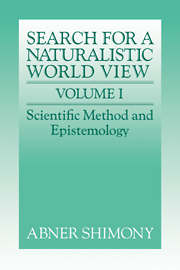Book contents
- Frontmatter
- Contents
- Acknowledgments
- A THE DIALECTIC OF SUBJECT AND OBJECT
- B PERCEPTION AND CONCEPTION
- 4 Perception from an evolutionary point of view
- 5 Is observation theory-laden? A problem in naturalistic epistemology
- C EPISTEMIC PROBABILITY
- D INDUCTIVE INFERENCE: THE DIALECTIC OF EXPERIENCE AND REASON
- E FACT AND VALUE
- Index
5 - Is observation theory-laden? A problem in naturalistic epistemology
Published online by Cambridge University Press: 21 December 2009
- Frontmatter
- Contents
- Acknowledgments
- A THE DIALECTIC OF SUBJECT AND OBJECT
- B PERCEPTION AND CONCEPTION
- 4 Perception from an evolutionary point of view
- 5 Is observation theory-laden? A problem in naturalistic epistemology
- C EPISTEMIC PROBABILITY
- D INDUCTIVE INFERENCE: THE DIALECTIC OF EXPERIENCE AND REASON
- E FACT AND VALUE
- Index
Summary
Erect your schemes with as much method and skill as you please; yet if the materials be … spun out of your own entrails … the edifice will conclude at last in a cobweb…. As for us the ancients, we are content with the bee to pretend to nothing of our own, beyond our wings and our voice, that is to say, our flights and our language. For the rest, whatever we have got, has been by infinite labour and search, and ranging through every corner of nature.
Jonathan Swift, The Battle of the BooksINTRODUCTION
The orthodox logical empiricist treatment of the relation between scientific theories and observations (as exemplified in the work of Rudolf Carnap, Ernest Nagel, Carl Hempel, and R. B. Braithwaite) abstained as a matter of principle from considerations of empirical psychology. Since psychology is the least developed of the natural sciences, an appeal to it was supposed to subvert the epistemological program of establishing a firm foundation for all the sciences. Furthermore, epistemology was not considered to be in need of the answers to the questions typically investigated by empirical psychology. It is also likely that the abstention of the orthodox logical empiricists from empirical psychology in their treatment of the relation between theories and observations was in large part due to their acceptance of Gottlob Frege's polemic against psychologism in logic, for they regarded the central problem concerning this relation to be one of logic.
- Type
- Chapter
- Information
- The Search for a Naturalistic World View , pp. 92 - 116Publisher: Cambridge University PressPrint publication year: 1993



